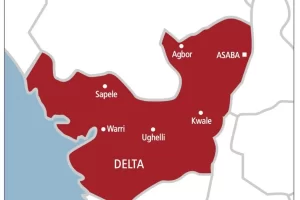Many Nigerians have argued that the governorship election in Osun state is a precursor to the 2023 election, which in their political views would be about the competence of candidates rather than the reach of political parties.
This view is predicated on the growing popularity of Peter Obi, the presidential candidate of the Labour Party.
Since its creation in 2002, Labour Party at best can be described as a fringe party that has produced only one governor.
Nigerian states are largely ruled by the All Progressives Congress (APC) and the Peoples Democratic Party (PDP). And due to the ubiquitous presence of the two parties, candidates contesting elections on their platforms have a higher chance of winning elections at both state and federal levels.
But since Obi dumped the PDP to join the LP barely two months ago, there has been a shift in Nigerians’ perception of the party.
Because of Obi’s presidential bid, the party Nigerians used to consider a pretender has suddenly become a contender that appears to be giving the mega parties sleepless nights.
Interestingly, Obi’s candidacy has changed the trajectory of the Labour Party. Political conversations that used to be all about the APC and the PDP on social media are now held in favour of the former governor of Anambra and this rubs off on his party.
In light of this, many have opined that the July 16 governorship election in Osun was largely about Adeleke. It is believed that the PDP won the election because of the personality it presented for the election.
While this argument holds water to some extent, it would be thoughtless to say the influence and popularity of the PDP in Osun were not pivotal to Adeleke’s victory.
What many Nigerians — who are most likely participating in a general election for the first time next year — do not know is that the Adelekes have a fine political history in Osun State.
Their father Raji Ayoola Adeleke, who was Chief Obafemi Awolowo’s ally was a Senator in the Second republic.
Isiaka Adeleke, Ademola’s late brother was Osun’s first democratically elected governor. He was serving the state as a senator when he died in 2017.
The governor-elect is not a newbie in Osun politics either. As a senator, he represented the people of Osun-west senatorial district between 2017 and 2019.
He contested for governorship in the state in 2018 but lost to Governor Gboyega Oyetola. The July 16 election was a rematch of the 2018 contest and this time, the people rejected Oyetola and sent the dancing senator to the state’s seat of power in Osogbo.
However, Adeleke’s victory in Osun was not solely dependent on his family’s political dynasty, the PDP played a huge role too to win back the state.
As a national party, the PDP has members across the country, and having ruled the state during the administration of Olagunsoye Oyinlola from 2003 to 2010, the party still has a strong presence and commands a huge following in the state.
In 2014, the governorship election in the state was a serious popularity contest between the APC and the PDP. But Rauf Aregbesola, the APC candidate emerged victorious with 394,684 votes while Iyiola Omisore of the PDP secured 292,747 votes.
In 2018, the PDP closed the gap as the APC candidate, Gboyega Oyetola beat Ademola Adeleke with 482 votes.
So, unlike the Labour Party and the Social Democratic Party (SDP), the PDP has been the main opposition party in Osun and returning to power after 12 years is not down to one factor.
The PDP had been winning elections in Osun state even before the governor-elect joined the party in 2017.
Moreover, out of the 15 parties that participated in the election, only the PDP has the structure and war chest required to challenge the APC in the state.
Therefore, to say the PDP won the election because it presented a dancing senator is absolutely a fallacy.
While Adeleke might have done well to endear himself to the people of Osun State after losing to Oyetola in 2018, we should not discount the fact that the PDP prepared the ground for him to walk to dance to a song of victory
Adeleke probably would have lost the election if he was a candidate of any of the fringe parties that participated in the governorship election.
However, the argument about party or personality as played out in the Osun election is being applied to the 2023 general elections.
Many Nigerians are of the opinion that due to the national clamour for good governance, the reach and structures of political parties will not be the deciding factor for victory for presidential candidates.
Those holding this view strongly believe that Nigerians will look out for the qualities of the candidate to vote for regardless of the parties that present them.
This is not the first time Nigerians will be having serious conversations about the qualities of presidential candidates ahead of elections, but the presence of Peter Obi on the ballot has added a new dimension to the 2023 election debate.
Past elections have shown that to win a national election, a politically strong candidate has to be fielded by an equally strong political party.
But if the growing popularity of Peter Obi, a presidential candidate of a structure-less political party is anything to go by, the APC and PDP template for winning the presidential election might be dealt with in 2023.
Unless this happens, parties’ structures will continue to be an advantage for candidates presented by mega parties.


![Personality or Party, what won Osun Election for PDP? [Editor’s Comment]](https://www.naijatabloid.com/wp-content/uploads/2022/07/Personality-or-Party-what-won-Osun-Election-for-PDP-Editors-990x520.jpeg)
















Add Comment